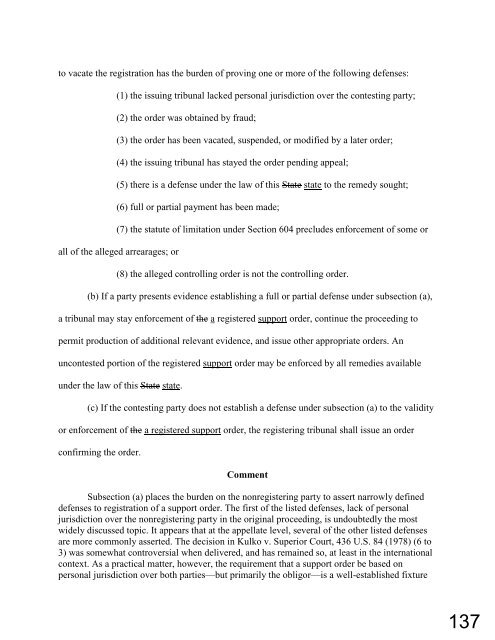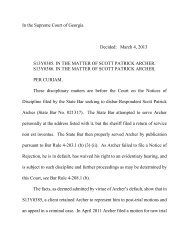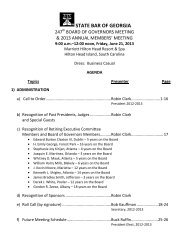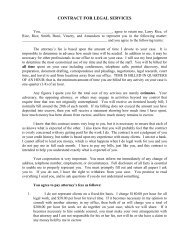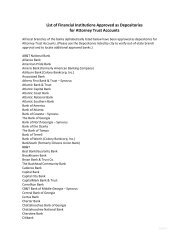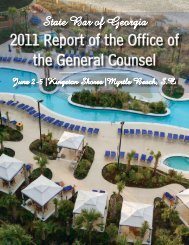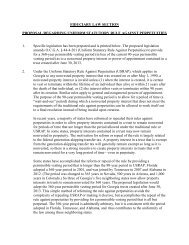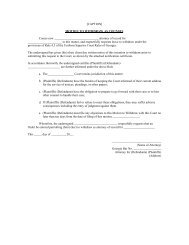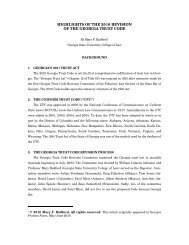2008 Amendments to the Uniform Interstate Family Support Act ...
2008 Amendments to the Uniform Interstate Family Support Act ...
2008 Amendments to the Uniform Interstate Family Support Act ...
Create successful ePaper yourself
Turn your PDF publications into a flip-book with our unique Google optimized e-Paper software.
<strong>to</strong> vacate <strong>the</strong> registration has <strong>the</strong> burden of proving one or more of <strong>the</strong> following defenses:<br />
(1) <strong>the</strong> issuing tribunal lacked personal jurisdiction over <strong>the</strong> contesting party;<br />
(2) <strong>the</strong> order was obtained by fraud;<br />
(3) <strong>the</strong> order has been vacated, suspended, or modified by a later order;<br />
(4) <strong>the</strong> issuing tribunal has stayed <strong>the</strong> order pending appeal;<br />
(5) <strong>the</strong>re is a defense under <strong>the</strong> law of this State state <strong>to</strong> <strong>the</strong> remedy sought;<br />
(6) full or partial payment has been made;<br />
(7) <strong>the</strong> statute of limitation under Section 604 precludes enforcement of some or<br />
all of <strong>the</strong> alleged arrearages; or<br />
(8) <strong>the</strong> alleged controlling order is not <strong>the</strong> controlling order.<br />
(b) If a party presents evidence establishing a full or partial defense under subsection (a),<br />
a tribunal may stay enforcement of <strong>the</strong> a registered support order, continue <strong>the</strong> proceeding <strong>to</strong><br />
permit production of additional relevant evidence, and issue o<strong>the</strong>r appropriate orders. An<br />
uncontested portion of <strong>the</strong> registered support order may be enforced by all remedies available<br />
under <strong>the</strong> law of this State state.<br />
(c) If <strong>the</strong> contesting party does not establish a defense under subsection (a) <strong>to</strong> <strong>the</strong> validity<br />
or enforcement of <strong>the</strong> a registered support order, <strong>the</strong> registering tribunal shall issue an order<br />
confirming <strong>the</strong> order.<br />
Comment<br />
Subsection (a) places <strong>the</strong> burden on <strong>the</strong> nonregistering party <strong>to</strong> assert narrowly defined<br />
defenses <strong>to</strong> registration of a support order. The first of <strong>the</strong> listed defenses, lack of personal<br />
jurisdiction over <strong>the</strong> nonregistering party in <strong>the</strong> original proceeding, is undoubtedly <strong>the</strong> most<br />
widely discussed <strong>to</strong>pic. It appears that at <strong>the</strong> appellate level, several of <strong>the</strong> o<strong>the</strong>r listed defenses<br />
are more commonly asserted. The decision in Kulko v. Superior Court, 436 U.S. 84 (1978) (6 <strong>to</strong><br />
3) was somewhat controversial when delivered, and has remained so, at least in <strong>the</strong> international<br />
context. As a practical matter, however, <strong>the</strong> requirement that a support order be based on<br />
personal jurisdiction over both parties—but primarily <strong>the</strong> obligor—is a well-established fixture<br />
137


